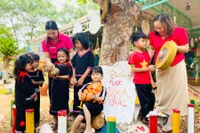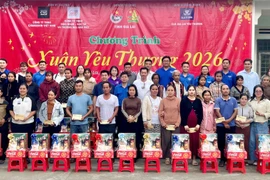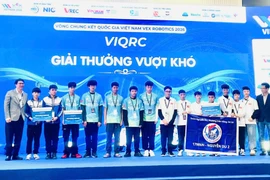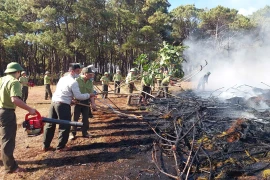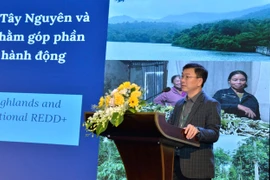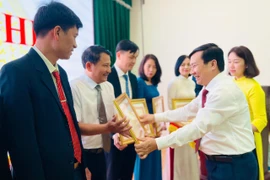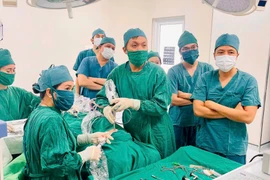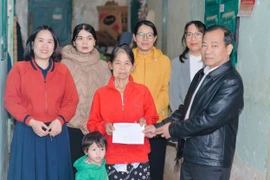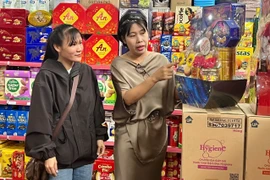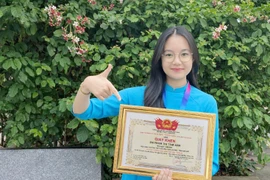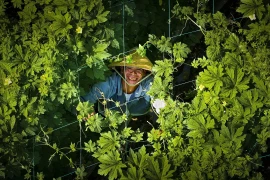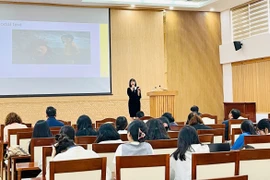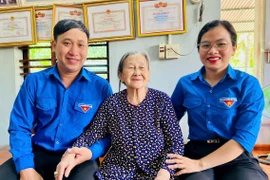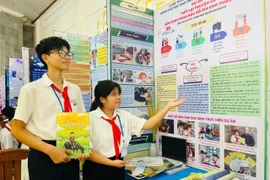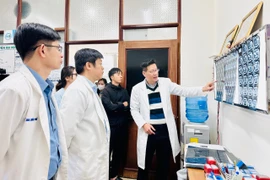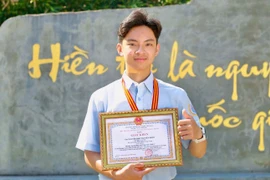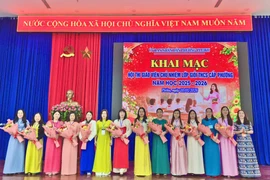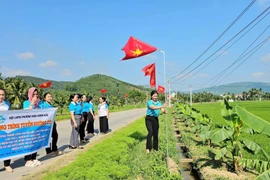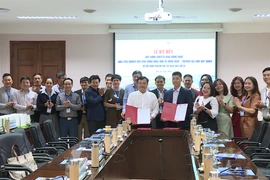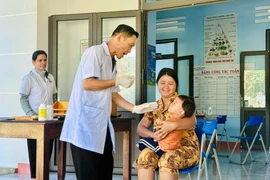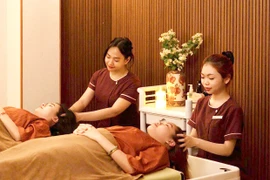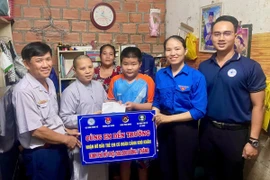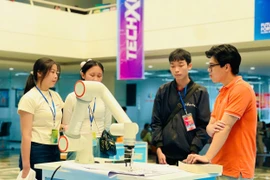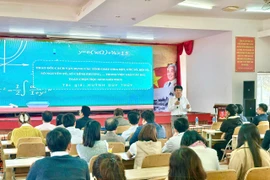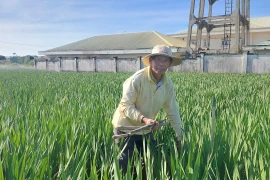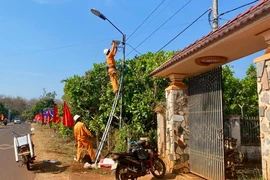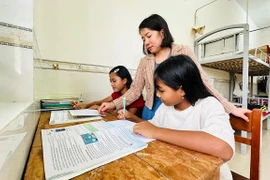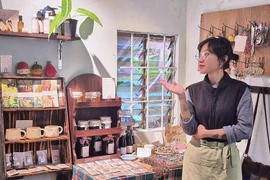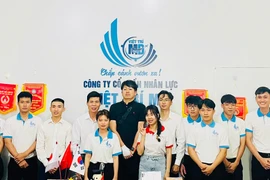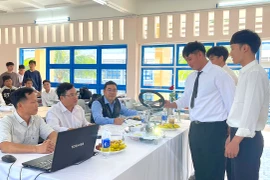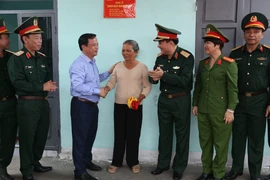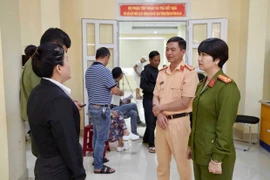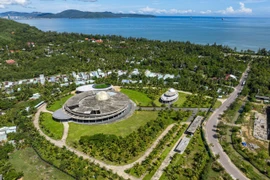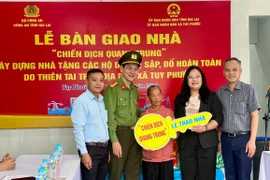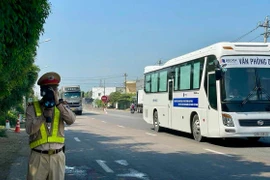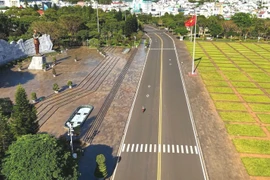These two women are Elder Ksor H’Blâm (Krông village, Ia Mơ commune) and Elder Siu Phyin (Goòng village, Ia Púch commune).
One was once a military Senior Lieutenant—Elder Ksor H’Blâm (born 1945), the other spent nearly two decades as Chairwoman of the Commune Women’s Union—Elder Siu Phyin (born 1950).
Both have reached an age considered “rare and precious,” yet remain steadfast pillars in their communities, serving as both spiritual anchors and bridges between the people and the Party, between the village and the borderlands.
When the people trust you, everything becomes easier
* Could you both share a bit about your daily routines in Krông and Goòng villages?
Elder Ksor H’Blâm: I’m 80 now. Every morning, I walk around the village, stopping by each fence to ask about the fields, the children going to school. My eyesight is dim, my steps are slow, but I’m used to listening to the wind and the voices in the village. If anything unusual happens, I know right away.
In the past, when people were still poor, I had a pension and raised cattle. If anyone was struggling, I’d lend them money or a cow. I never pressured them to repay, just advised them to use it for farming or buying seedlings, not for spending. Now, people’s lives are more stable, no one needs to borrow anymore, and I’m happy—as if I’ve repaid my debt of gratitude to the village!
Elder Siu Phyin: I’m 75 now, but I still enjoy sitting at the loom weaving brocade, or going to the fields to plant cashew, cassava, and raise cattle. I guide people in preserving traditional weaving and actively join local authorities and Border Guard officers in encouraging villagers to work hard, maintain security and order, and not listen to bad influences. When the people trust you, everything becomes easier. If you live honestly and act sincerely, they will believe in you.
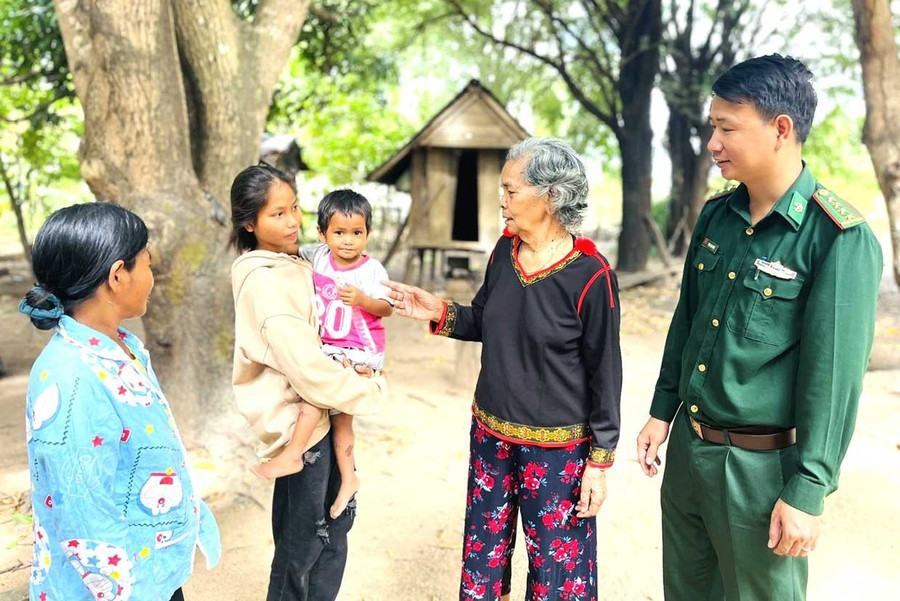
* As women who have been honored as village elders—a role traditionally reserved for men—did you have any reservations?
Elder H’Blâm (smiling gently): In 1998, when the previous village elder passed away, Krông village lost its “spiritual leader.” A village meeting was quickly held to elect a successor. Unexpectedly, everyone chose me. I refused at first, thinking the role was meant for elderly men. But the villagers said, “You served in the army, fought in the war, are literate, and understand the people.” So I accepted, seeing it as a new duty for a Party member.
Elder Siu Phyin: It was the same for me. In 2016, the people of Goòng village elected me as village elder, making me the first female elder in the border commune of Ia Púch. At first, I was very anxious—afraid I wouldn’t fully grasp the people’s wishes or think of all the good things for them. But with the villagers’ trust and encouragement from the previous elder, I accepted. Looking back now, I feel happy and proud. Doing something useful for the people and the village makes my heart as light as the wind over the cashew hills.
Lead by example, speak after
* In your view, how does one earn the people’s trust and respect?
Elder H’Blâm: You must speak little and do much. In the past, villagers didn’t believe cattle could survive in the border region because of the harsh climate. I knew that to change the community’s mindset, words alone wouldn’t suffice, so I led by example. I bought cattle and raised them myself. When the cows reproduced and people saw it with their own eyes, they believed and followed suit. For those without money, I lent them breeding stock and taught them how to care for the animals. Now, not only Krông but many neighboring villages have herds of cattle, know how to plow wet rice fields, and life is much better than before.
Elder Siu Phyin: The “authority” of a village elder isn’t just in words, but in actions. Seeing people still struggling while hillsides lay fallow, I decided to pioneer cashew planting. At first, many doubted, saying, “Cashew trees won’t survive here.” But when the trees took root, blossomed, and bore fruit, they came to see and then started to follow. Like gentle rain soaking in over time, persistent small actions build trust.
* Could you share some of the challenges you face in mobilizing and educating the community?
Elder Siu Phyin: The hardest part is changing deeply ingrained mindsets and habits. Some people understand after one explanation, but with others, you have to patiently analyze and explain five or seven times before they truly grasp it. In the past, people would bury valuables with the dead or call shamans when sick; now, those practices are gone. Weddings and funerals are now simpler and more economical. Every time I see people change, I feel as happy as a bumper harvest.
Elder H’Blâm: I remember joining local authorities, going door to door to persuade villagers to relocate and give up land for the Ia Mơr irrigation project. Everyone was reluctant to change, afraid of losing ancestral land. I understood, so I visited each household, listened, and explained the common benefits. Now, the fields have water, we can grow two rice crops a year, and people are better off. All the effort was worth it.
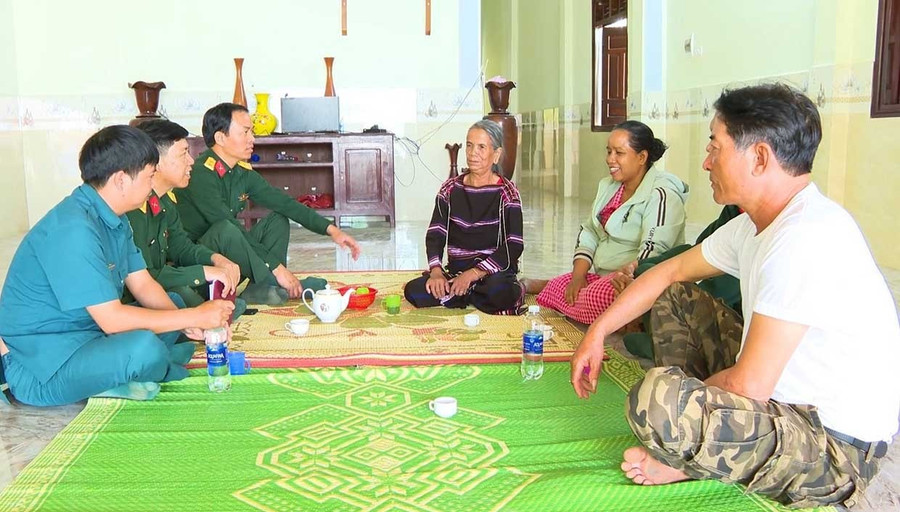
Spiritual pillars, bonds of community unity
* You are not only “spiritual anchors” but also bridges between the people and the authorities. How do you regularly coordinate and work with the Border Guard?
Elder H’Blâm: I join the soldiers in raising awareness, reminding people to protect the forests and the border, and not to listen to bad influences. When there are conflicts in the village, I work with officials to mediate. If you speak with reason and compassion, people will listen.
Elder Siu Phyin: I always tell the people to be grateful to the Party, the revolution, and the soldiers—without them, the border wouldn’t be as peaceful as it is today. Protecting the border isn’t just about guarding the land, but also preserving village bonds and people’s hearts. That’s why we encourage each other to study, work hard, uphold and promote our ethnic traditions, and eliminate outdated customs; we must stand united and love one another so the village grows strong and the border remains secure.
* Looking ahead, what are your hopes for your villages and your people?
Elder H’Blâm: I hope the Party and State will continue to support and help maximize the effectiveness of the Ia Mơr irrigation project, bringing water to the fields and enabling people to farm with peace of mind. I also hope for more investment in transportation infrastructure to make travel and trade easier, and for better schools so our children have good learning conditions. When life is stable, people will be even more attached to their villages and the border.
Elder Siu Phyin: I just hope officials stay close to the people and listen more. Our people are still poor and lack knowledge, so they need guidance. When the authorities and the people are united, the border will truly be peaceful.
* Thank you both for sharing. Wishing you good health and continued strength as the “flames of unity” warming your villages!
For their tireless contributions to the community, both female village elders have been honored multiple times.
In 2024, Elder Ksor H’Blâm was awarded the 80th Anniversary Badge of the Vietnam People’s Army by General Phan Văn Giang, Minister of National Defence, at the “Historical Path” program, recognizing her dedication to maintaining peace in the border region.
Also in 2024, Elder Siu Phyin was honored at the second “Pillars of the Village” program, jointly organized in Hanoi by the Communist Review, the Central Committee of the Vietnam Fatherland Front, and the Border Guard Command. In 2025, she also received a certificate of merit from the provincial Vietnam Fatherland Front Committee for outstanding achievements in the patriotic emulation movement for 2020–2025.

